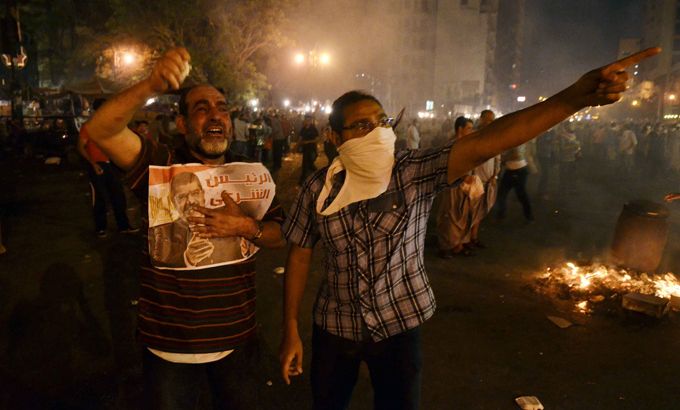Seven dead in Cairo clashes
Hundreds more injured in Egyptian capital as top US diplomat becomes first to visit country since Morsi’s removal.

Health officials say that clashes overnight between police and supporters of Egypt’s deposed President Mohammed Morsi have left at least seven people dead in Cairo.
Khaled el-Khateib, a senior health ministry official, said that about 261 people were also injured in the violence that broke out late on Monday and carried on into the early morning hours in four different locations in the capital.
Mohamed Sultan, the head of Egypt’s emergency services, told the Reuters news agency that two people were killed at a bridge in central Cairo and five more in the city’s Giza district.
The Muslim Brotherhood said that police used birdshot and live ammunition against protesters.
Egypt’s state news agency said 17 policemen were injured in the violence, and 401 people have been arrested in relation to the clashes.
Thousands of supporters of Morsi, who was overthrown by the military earlier this month, were protesting to press their demands that Morsi be reinstated as president.
Egypt’s military deposed Morsi on July 3 after days of mass street protests calling for him to step down.
The ousted president’s supporters say he was removed by a military coup that overturned democratic rule.
Police had reportedly fired tear gas at the protesters on and around Ramses Square, who retaliated by throwing rocks back at them.
Many of the injured received treatment at a makeshift ward. Others were treated in ambulances on-site, some for inhalation and contact with tear gas, and others for superficial wounds.
The clashes marked the first violent confrontation involving pro-Morsi protesters for a week.
‘Plan to paralyse parts of city’
Al Jazeera’s Nicole Johnston, reporting from Cairo, said that riot police were involved in the clashes, while the military stood on the sidelines.
“It is difficult to find out why it happened, but the Muslim Brotherhood had been planning a very large rally. They had brought in people from other governates on Monday,” Johnston said.
“Some people had said that they plan to try and paralyse parts of the city to block roads.”
“But anytime you try to block the October 6 bridge then you are going to get a reaction and thats exactly what happened”.
Last week, 53 pro-Morsi demonstrators were killed outside the Republican Guard compound in Cairo. Four soldiers also died in the clash.
US visit
Earlier on Monday, US Deputy Secretary of State William Burns made the first senior level visit to Egypt since Morsi was overthrown by the military on July 3 following days of mass protests.
Burns held talks with Egypt’s interim leaders and the head of the military.
Washington has been sharply criticised by both Morsi’s supporters and opponents for what each side perceives as support for their rival’s position.
“Only Egyptians can determine their future. I did not come with American solutions, nor did I come to lecture anyone. We know that Egyptians must forge their own path to democracy. We know that this will not mirror our own and we will not try to impose our model on Egypt,” Burns said.
However, Burns added that the US would “stand behind certain basic principles, not any particular personalities or parties.”
He said that the US backs those siding with the aspirations of Egyptians who went out during the 2011 uprising against longtime autocratic leader Hosni Mubarak.
Maximum restraint
Burns said that despite concerns about developments of the last two weeks, the US believed that the ongoing transition was an opportunity, following the 2011 revolution, to create a democratic state that “protects human rights and the rule of law and that enables the economic prosperity of its citizens”.
“We support the adoption of reforms that can lead to an early IMF agreement while sustaining funding for social safety net programmes,” he said.
The US deputy secretary went on to condemn violence at demonstrations in the Sinai and sectarian violence, calling on maximum restraint by security forces.
Burns maintained previous US statements and refrained from saying Morsi was the victim of a coup.
If the US terms the deposing of Morsi a coup, it would legally be required to freeze some $1.5bn in US military and economic assistance to Cairo.
National reconciliation
In the latest development on Tuesday, a spokesman for Egypt’s interim president said that authorities expected Islamist movements, including the Muslim Brotherhood, to join in national reconciliation.
“We expect most Islamic currents to participate in reconciliation … including the Muslim Brotherhood,” Ahmed Elmoslmany told reporters in Cairo.
He said the Muslim Brotherhood and the Islamist Nour Party had both been offered cabinet posts.
Both groups have refused to participate in the government, although Nour has said it will advise interim Prime Minister Hazem el-Beblawi.